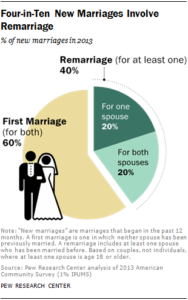Modern families want (and need) modern estate planning solutions. It’s no longer a “one size plan fits all” scenario where wealth follows marriage and blood lines. Partners are choosing not to marry. Families are blending after previous marriages. Parents are conceiving using artificial technology or adopting. Same-sex couples are creating families. Grandparents are raising their grandkids. Generations are growing further apart in years, so what about future family members and future non-traditional scenarios? Creating a trust for the modern family is key.
If you’re one of the two thirds of non-traditional families out there, your estate plan is a little more complicated and probably requires more than just a will. Creating a trust is essential to making sure your family – both whatever it may look like and whomever it may include – is taken care of upon your passing.
Creating a Trust – Creating a Solution
 A living will is simply not enough to protect most families when the patriarch and/or matriarch passes. A will only accounts for the basics, such as who gets your assets and it is a public document that will go through probate which may be a lengthy and costly process.
A living will is simply not enough to protect most families when the patriarch and/or matriarch passes. A will only accounts for the basics, such as who gets your assets and it is a public document that will go through probate which may be a lengthy and costly process.
What’s more, many states’ laws work on a “traditional” family structure, so if you don’t have a will or an estate plan, the law will likely not protect your interests or work things out the way you would have wanted.
Every family is different. And each unique situation needs a custom-created estate plan. To help outline your plan and potential needs, think about these five factors:
- Goals. What do you want your estate plan to accomplish? This could be protecting a spouse, supporting your children financially or providing for your grandchildren’s education. Write your goals down and see what it will take to achieve them.
- Family members. Who will reap the benefits of your wealth; who do you want your money and assets to go to? Also think about who you want to control your legacy upon your death.
- Amount. How much will each person get?
- Timing. When will the beneficiaries receive the inheritance? This could be a point in time, such as a date, or related to the beneficiary’s age.
- What. Are you leaving an outright gift or will it require provisions? This is where trusts come into play.
 In many cases, creating a trust (or multiple trusts) is the most secure way to address modern family situations. In fact, the number of trusts that provide for a surviving spouse or non-marital partner are on the rise.
In many cases, creating a trust (or multiple trusts) is the most secure way to address modern family situations. In fact, the number of trusts that provide for a surviving spouse or non-marital partner are on the rise.
With a trust, you can be specific and deliberate, ensuring that your wishes are carried out to the letter. Trusts also pass outside of probate, which means less red tape, delays and potential challenges.
Start with a living trust. This can include everything from investment accounts to personal property and real estate. You control the trust until your death, then the trust is passed along to the person you choose (trustee) to carry out your wishes.
Stepping Up with Multiple Marriages
Of new marriages, nearly half include at least one person who has married previously. Thus, second spouses are often one of the most perplexing estate planning issues. Especially if there are children from any or all of the marriages.
How do you ensure the second spouse lives comfortably while the children receive an inheritance?
Creating a trust is once again the solution. A marital trust can be set up for the step parent/second spouse/widow to include several specific provisions and benefits for both the surviving spouse and the children. This trust is a fiduciary relationship between the grantor and trustee and only goes into effect when the first spouse dies. At that time, assets move to the trust and the income goes to the surviving spouse. When  both spouses have passed, the trust is passed to the designated heirs. A marital trust is particularly important if this second spouse is expected to outlive the provider.
both spouses have passed, the trust is passed to the designated heirs. A marital trust is particularly important if this second spouse is expected to outlive the provider.
For example, a marital trust can specify that your spouse can live in your home for the remainder of his or her life, but that your home will ultimately be passed to your children. A marital trust gives your spouse rights, while also providing for your children and putting the asset management on the trustee.
Another option to consider is a grantor retained annuity trust (GRAT) – creating a trust for a specific term or time period. You pay a tax when you set up this irrevocable trust, then you put your assets under the trust. An annuity is paid for throughout the term of the trust and when the trust expires, the beneficiary receives the assets tax-free. A GRAT is a good option to minimize taxes on financial gifts.
Estate Planning Add-Ons
While trusts offer the most protection and direction, there are a few additional pieces that you may want to add to your estate plan. First, consider a power of attorney. This election will be particularly important if you are incapacitated at any point in your life, not just your end of life.
For instance, if you are hospitalized and unable to make decisions, a financial power of attorney can manage your finances for you, as you would have wanted. A healthcare power of attorney would then make healthcare decisions on your behalf and is not tied to your finances.
 If you want to leave money to your grandchildren and make sure they use it for education, you can set up and fund a 529 plan: a tax-advantaged savings plan for education costs. The funds can be used to pay for “qualified tuition plans” authorized by Section 529 of the Internal Revenue code. States and private colleges or universities sponsor a prepaid tuition plan or education savings plan.
If you want to leave money to your grandchildren and make sure they use it for education, you can set up and fund a 529 plan: a tax-advantaged savings plan for education costs. The funds can be used to pay for “qualified tuition plans” authorized by Section 529 of the Internal Revenue code. States and private colleges or universities sponsor a prepaid tuition plan or education savings plan.
If you have children under age 18, your estate plan should also name guardians for your children and dictate how your estate will support the children in the event of your death. While difficult to think and talk about, it’s often best to make these decisions and formalize a plan early, while everyone is in good health.
An Ever-Evolving Estate Plan
Keep in mind that whatever your estate plan includes, it can and should be updated as your life changes. New members will join your family unit, you’ll acquire or sell assets, and your goals will likely change or narrow.
You want your trusts and wishes to reflect your journey at its current path while keeping an eye on the future. Trusts help you and your family – whomever it includes – enjoy the wealth that you’ve spent your lifetime accumulating.
Creating a trust is a process that requires financial knowledge along with experience and a personal touch. Stableford Capital values personal interactions with its clients and creates every estate plan custom to your modern family’s needs and goals. To learn more about creating a trust and how to keep your estate plan up-to-date, contact Stableford by calling 480.493.2300, or contact us online.
